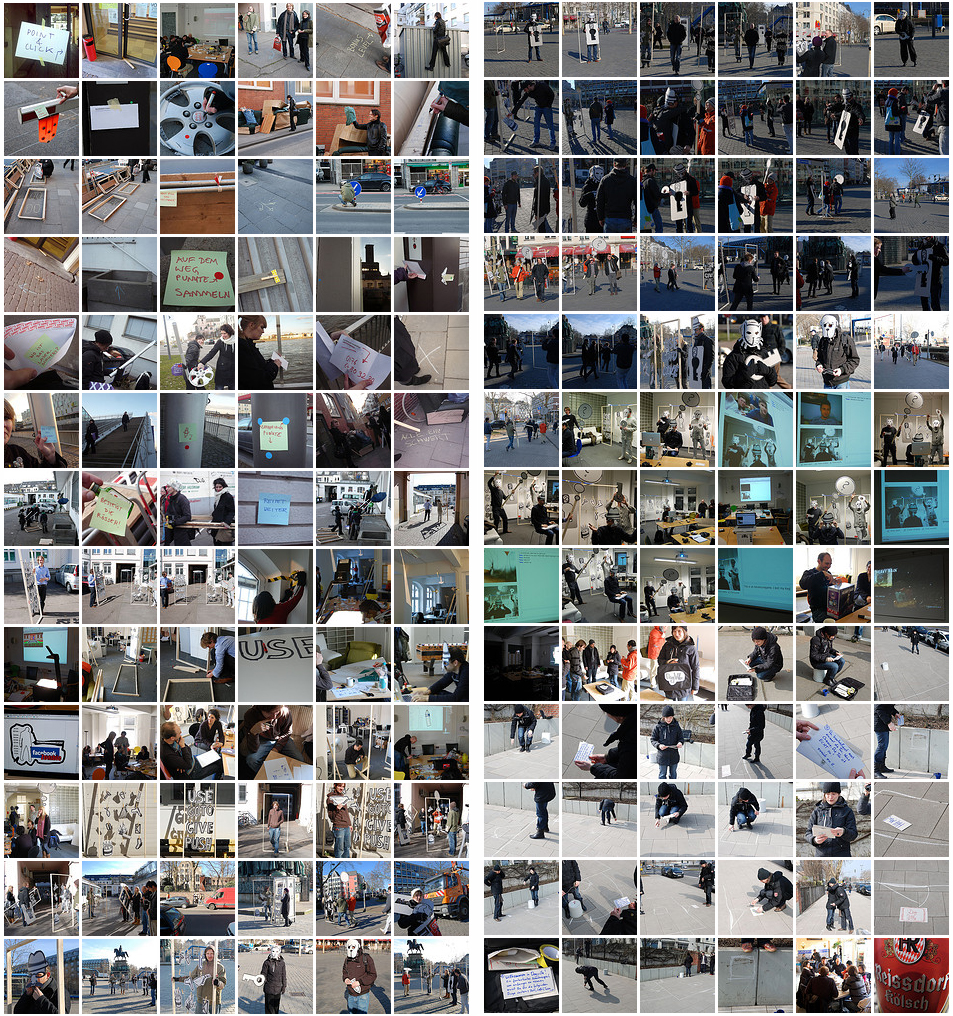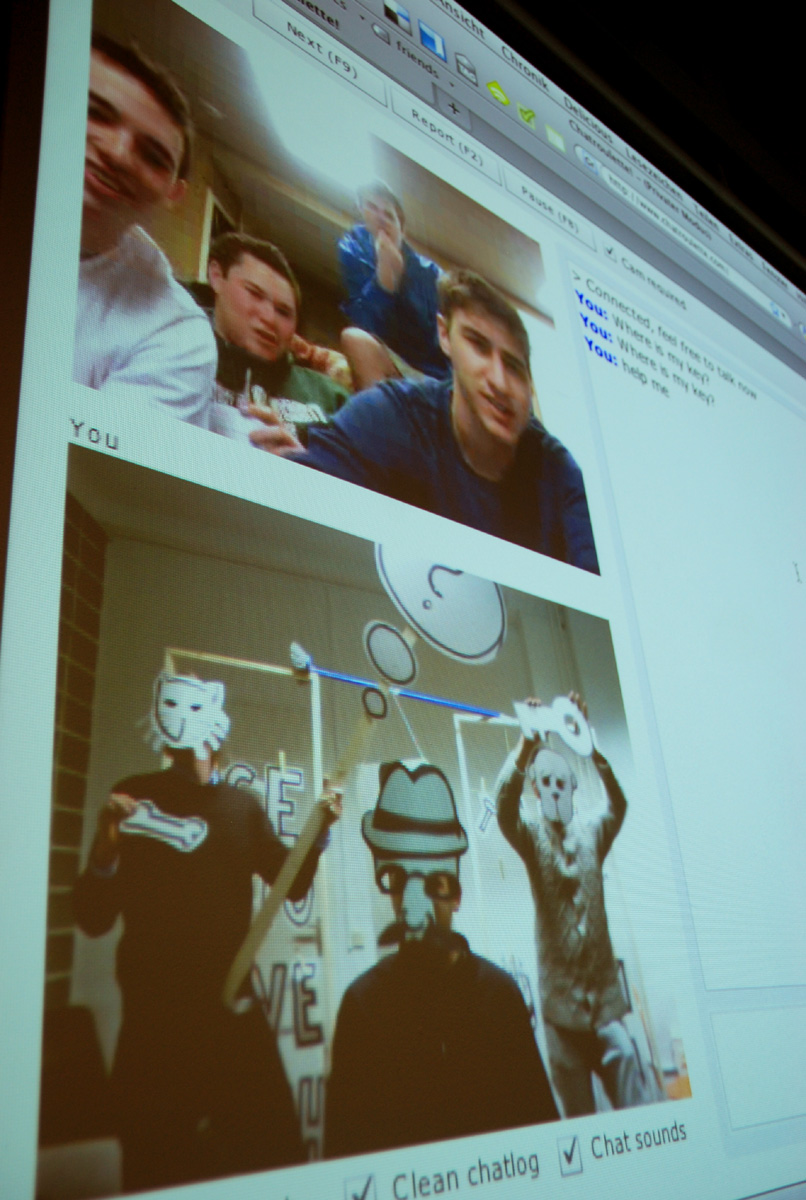Point & Click reader

Thanks to Jonas and Lasse the Point & Click documentation reader (german) is in print right now and also available in PDF format here.
The Point & Click workshop will be presented at the Next Level conference Cologne 20.-21.4.2010
Plz find all prior P&C related posts here
In the text below which is part of the reader I am describing my typical way of conducting a workshop with all its related questions on public space, privacy and online ’sphere‘.
_________________________
Hands-On-Workshop und Irritation im öffentlichen Raum
Schere, Stift und Papier in der Ära der Digital Natives
Es ist immer wieder spannend mit einer Gruppe mehrere Tage intensiv an einem Thema zu arbeiten und die verschiedenen Stadien von Diskussion und Aktion zusammen zu erleben. Das Format des Workshops ist an sich keine neue Erfindung. Gruppenarbeit und Partizipation in Prozessen ziehen sich in verschiedenen Kontexten schon länger durch die Jahrzehnte, bergen aber in der vernetzten Welt von Computer und Internet eine neue Qualität. Die wachsende Anzahl sozialer Berührungen, die wir tagtäglich online per Social-Datenkanal – ob E-mail, Chat oder Facebook/Twitter – erleben, steht einem eher konstantem Feld echter Begegnungen im alltäglichem Leben da Draußen gegenüber. Umso spannender ist es, sich mit einer Gruppe von Studenten (Neudeutsch auch „Digital Natives“) für ein paar Tage an einen Tisch zu setzen und im direkten Kontakt über das Verhältnis Online-Offline nachzudenken.
Ungeachtet des Themas und der Länge eines Workshops starten wir mit einer Vorstellungsrunde über persönliche Nutzungsgewohnheiten im Internet und Vorlieben am Computer. Auch wenn sich die Teilnehmer aus ihrem Uni-/Schulalltag relativ gut kennen, kommen sie beim Austausch über Onlinegewohnheiten manchmal ins Staunen. Ein stiller Kommilitone erweist sich als Forumsbetreiber mit 10.000 Usern und ist Musiker in einer virtuellen Band. Im Gegensatz dazu sind wir überrascht, wenn wir einen langjährigen Internetkontakt im realen Leben zu Gesicht bekommen. Jemand der Online sehr laut, ist stellt sich plötzlich als ganz zurückhaltende Person heraus. Das Verhältnis der On- und Offline-Identitäten und die verschiedenen Überschneidungen der Freundenetzwerke, sowohl hier als auch dort, bieten einigen Stoff für Diskussion.
Neben der thematischen Diskussion ist es spannend, in spontanen Aktionen zum Thema möglichst früh in den öffentlichen Raum zu gehen um dort zu experimentieren. Was ist der öffentliche Raum und wie verhalten wir uns dort? Welche Mittel und Orte eignen sich für eine spätere „Aufführung?“ Es ist wichtig den Stadtraum losgelöst vom Alltag, aus einer neuen Perspektive und unter Berücksichtigung eines Themas zu beobachten. Die gemachten Erfahrungen lassen sich gut in die Ideenentwicklung einarbeiten und helfen, die Möglichkeiten für eine spätere Aufführung einzuschätzen.
Zentral ist immer wieder die Frage, wie der öffentlichem Stadtraum im Verhältnis zum öffentlichen Raum im Netz, mit seiner rasanten Entwicklung, steht. Wo gibt es welche Regeln? Wie verhalten sich die Nutzer wo? Der Stadtraum unterliegt je nach Land und Kultur ganz bestimmten gesellschaftlichen und sozialen Konventionen, welche sich, wenn überhaupt, nur langsam über Jahrzehnte ändern. Das Nutzerverhalten im Internet hat sich in den letzten Jahren dagegen rapide verändert. Bezogen auf die Privatsphäre war es im Internet Anfang 2000 zum Beispiel nicht üblich, mit seinem vollen Familiennamen zu erscheinen. Spätestens seit Facebook ist der Nick-Name aber dem echtem Namen gewichen. Die Partyfotos kamen dann kurz danach. Jemand Unbekanntes im Supermarkt nach seinem Namen zu Fragen ist eher unüblich, wenn auch nicht unmöglich. Die Anonymität der Großstadt erscheint uns als selbstverständliche Qualität. Diese wird aber in naher Zukunft wahrscheinlich von Social Networks und Targeted Marketing unterwandert werden. Die Frage, wie sich der veränderte Umgang mit Privatsphäre langfristig auf die Begegnung im öffentlichen Stadtraum auswirkt, bleibt interessant.
Das zusammen Arbeiten, Ideen Entwickeln und Umsetzen lässt die Gruppe über den Zeitraum von wenigen Tagen schnell zusammenwachsen. Neben der Diskussion ist die praktische Arbeit mit klassischen Materialien und Werkzeugen wie Papier, Schere, Kleber, Holz, Nägeln, Hammer etc. sehr wichtig. Den Teilnehmern fällt oft auf, dass es schon eine Weile her ist, dass sie das letzte Mal etwas aus Pappe gebastelt oder mit der Schere ausgeschnitten haben. Das Meiste wird heutzutage per Tastatur, Maus und Touchinterface erledigt. Die Arbeit mit den Händen und das spontane Entwickeln aus dem Tun heraus, sind ein zentraler Bestandteil dieser Workshops. Über den digitalen Raum zu diskutieren um dann mit Hammer und Nagel etwas zu bauen ist eine großartige Kombination, um unser tägliches Leben im digitalen Zeitalter aus einer anderen Perspektive zu betrachten.
Am Ende eines Workshops findet meist eine Intervention oder Performance im öffentlichen Raum statt. Mal werden die Konzepte in kleinen Einheiten an verschiedenen Orten umgesetzt, ein anderes Mal als ganze Gruppe mit schauspielerischen Ambitionen auf einem zentralem Platz aufgeführt. Es ist interessant zu beobachten, wie unterschiedlich in verschiedenen Kulturkreisen „das Publikum“ – die Menschen in der Stadt – auf eine Intervention reagieren. Ein Eingriff, der in China z.B. großes Aufsehen erregt, ruft in einer deutschen Fußgängerzone eventuell nur Achselzucken hervor. Sich zu überwinden die Konventionen des öffentlichen Raumes zu brechen wird oft mit interessanten Gesprächen mit den Zuschauern belohnt. Anstatt in einem Blog oder auf Twitter über das digitale Zeitalter zu chatten, wird hier die Diskussion über Computerspiele, Facebook und Apple direkt auf der Straße geführt.
Aram Bartholl 2010

